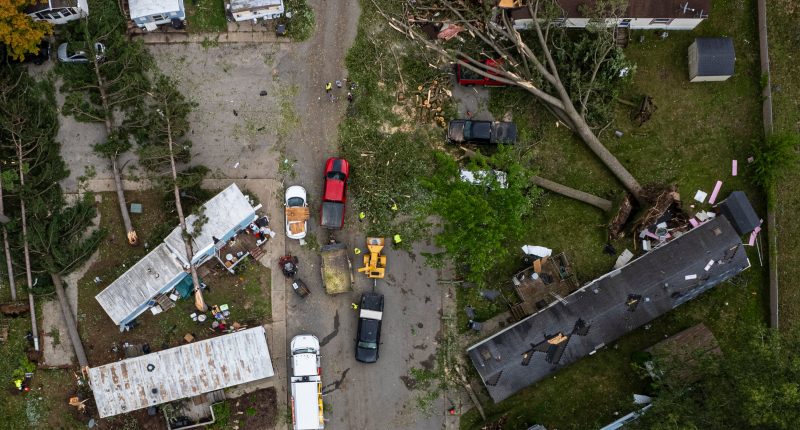At least six tornadoes have touched down in the midwestern state of Michigan as part of a series of severe storms, killing five people and leaving hundreds of thousands of residents without power.
The National Weather Service in the United States confirmed on Friday that a tornado with winds of 145 kilometres per hour (90 miles per hour) crossed from Michigan’s Ingham County into the western edge of adjacent Livingston County on Thursday night.
The storm was given a ranking of EF-1, the second lowest on the Enhanced Fujita scale. Four other EF-1 tornadoes were reported in Bellville and Gibraltar in Wayne County, as well as near South Rockwood and Newport in Monroe County.
A weaker EF-0 tornado with peak winds of 128km/h (80mph) was on the ground for less than 3.2km (around two miles) in Wayne County’s Canton Township, west of Detroit, the weather service said. That tornado caused a tree to fall into a house, said meteorologist Sara Schultz.
The weather service office in Grand Rapids, in western Michigan, said officials would be in the field Friday conducting damage surveys on another suspected tornado in Kent County.
In western Michigan, the Kent County sheriff’s office said a 21-year-old woman and two girls, ages one and three, died on Thursday night after their car struck an SUV.
The driver in the car, a 22-year-old Gowen man, suffered serious injuries. The SUV driver suffered minor injuries.
“There [were] two vehicles traveling toward each other. One hydroplaned on water and it was occupied by four people,” Kent County Sergeant Eric Brunner told the news station WZZM-TV.
In Lansing, the state capital, an 84-year-old woman died on Thursday night after a tree fell on a home. Firefighters extricated the woman from the home, but she was pronounced dead at a hospital, Lansing Police Department spokeswoman Jordan Gulkis said.
In Ingham County, where Lansing is located, the sheriff’s office said Friday that one person was confirmed dead and several people severely injured as more than 25 vehicles were severely damaged along Interstate 96.
It was not immediately clear early Friday afternoon if the storm or a crash was responsible for the wrecks on the freeway.
In the north Detroit suburb of Southfield, Muqitu Berry said he was in his ranch home at approximately 9:30pm on Thursday (01:30 GMT Friday) when a large part of the trunk of a neighbour’s tree came crashing down, sounding “like a train coming through”.
The tree ended up across the front of Berry’s driveway and yard. As it fell, it took down power lines, dropping them onto Berry’s driveway and at least one vehicle, leaving him and his neighbours without power.
It was not immediately clear early Friday afternoon if the storm or a crash was responsible for the wrecks on the freeway.
In the north Detroit suburb of Southfield, Muqitu Berry said he was in his ranch home at approximately 9:30pm on Thursday (01:30 GMT Friday) when a large part of the trunk of a neighbour’s tree came crashing down, sounding “like a train coming through”.
The tree ended up across the front of Berry’s driveway and yard. As it fell, it took down power lines, dropping them onto Berry’s driveway and at least one vehicle, leaving him and his neighbours without power.
“I can’t get out of my driveway. I can’t go anywhere,” Berry said Friday morning. “We’re out of power, and it’s very frustrating.”
Wayne County Executive Warren Evans declared a state of emergency on Friday in Michigan’s largest county, which includes Detroit, due to power outages, flooding, fallen trees and power lines and storm debris.
The county also warned residents after flooding caused municipalities to discharge partially or fully untreated wastewater into various waterways.
Canton Township, a community of some 100,000 people, was hit earlier this week by flooding in its downtown business district.
“Some of our parks are destroyed,” township supervisor Anne Marie Graham-Hudak said, adding that the township received calls from 200 residents regarding flooding in their basements.
More than 390,000 customers in Michigan and over 120,000 in Ohio were without power as of about 7:15pm (23:15 GMT) Friday, according to the Poweroutage.us website.
Thursday night’s storms followed a round of heavy rain Wednesday that left areas in southeast Michigan with over 12.7 centimetres (5 inches) of precipitation by Thursday morning, resulting in street flooding in the Detroit area.
On Friday, Michigan Governor Gretchen Whitmer declared a state of emergency for Wayne and Monroe counties, which makes state resources available to help with response and recovery efforts related to the storm damage.
The storms pushed east across Lake Erie and into northeast Ohio, uprooting trees and leaving thousands of homes and businesses without power.
A tornado also tore through part of Cleveland late Thursday night. Its path was about 137 metres wide and nearly 1.6 kilometres long (about 1 mile). No injuries were reported, but several buildings were severely damaged.
Scientists say that, without extensive study, they cannot directly link a single weather event to climate change – but that climate change is responsible for more intense and more frequent extreme events such as storms, droughts, floods and wildfires.
Source:aljazeera.com





